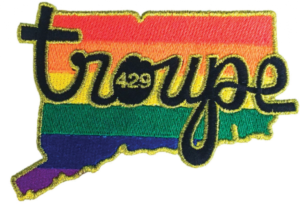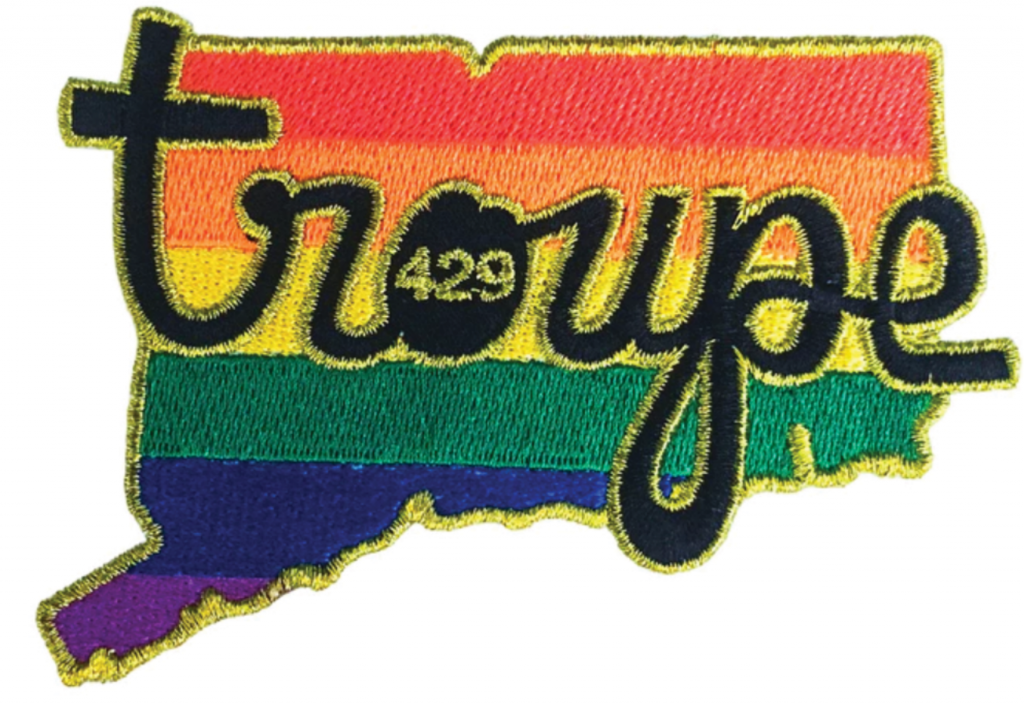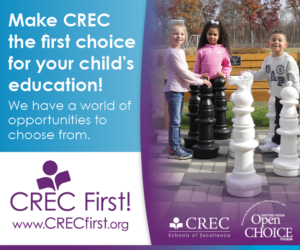Fairfield County is home to a growing number of LGBTQ-friendly venues, events
By Quinn Roberts
If you could have decorated your childhood bedroom the way you’d wanted, what would it have looked like?
Enter Troupe429, and you’ll immediately come down with a case of gay teenage fever. Look, by the door, there’s the Mario Kart and Pokémon video games playing on the flat screen TV. Further down, the bookshelf of classic feminist texts, the bulletin board offering resources from local nonprofits. Across from the bar, the DJ plays an old-school Britney Spears hit, and soon enough your friends hit the dance floor. You smile, shake your hips, and remind yourself where you are: in Norwalk, Connecticut, a place you never realized was just this queer.
Flirtations with nostalgia are embedded in every detail of the Troupe429 experience. 429 spells G-A-Y on the telephone keypad, say Casey Fitzpatrick and Nicholas Ruiz, the owners of Troupe429. During the Stonewall era, this was used as a code to know if someone was ‘429.’ This piece of trivia, subtle as it may be, reflects Fitzpatrick and Ruiz’s broader efforts to express their reverence to and passion for the queer community. They want to make it clear: Troupe429 is by and for the community.

Each night offers a fresh, exciting experience – no two visits to Troupe429 will be quite the same. For unleashing your inner diva, come check out the monthly open mic night, hosted by Connecticut-based drag queens Robin Fierce and Sienna Rose. For the sapphic moments, there’s SIREN, the largest party for queer women in Connecticut. Tuesday night bingo and Wednesday karaoke offer a more relaxed vibe; higher-stakes evenings have seen appearances by “RuPaul’s Drag Race” alumni Aja and Ivy Winters.
Event planning allows Fitzpatrick and Ruiz to flex their creative muscles, as well as provide a positive, fun space for community. “It’s been magical to watch friendships form between people who may have never met outside Troupe429,” says Ruiz. “We are a neighborhood bar for all people and all allies.”
Increasingly, the business scene throughout Fairfield County is affirming its support for the LGBTQ community. Norwalk’s Rene Soto Gallery and Westport’s Mystic Market are owned and managed by queer Connecticut residents. Established presences too, such as Garden Cinemas in Norwalk and the Westport Country Playhouse, have introduced and promoted LGBTQ-friendly programming.
These places are making their marks at a curious time in Connecticut’s history, as New York City’s increasingly exorbitant prices are sending an influx of Manhattanites to its outer suburbs in search of more affordable housing. As Fairfield County becomes a hub for queer life, one could reasonably wonder: how will Fairfield County accommodate both its current and future LGBTQ residents? Might this shift in urban terrain be forming a “gayborhood”?
Before many of these businesses opened, the search for queer community often led to the Triangle Community Center (TCC), a Norwalk-based nonprofit that fosters growth and connection within the LGBTQ community.
“It’s great to serve the LGBT community in a formal capacity,” says Sean-Michael Hazuda, the newly appointed executive director of the TCC. “If you look at many, many towns across the globe, these resources are provided by churches and religion. Now, in addition to religious groups, the TCC can offer LGBTQ specific resources to Connecticut.”
Since 1990, the TCC has been Fairfield County’s foremost provider of resources and programming for the LGBTQ community. For the first few decades, efforts were decentralized and entirely volunteer-run; in 2013, the TCC hired a full-time staff, and soon thereafter introduced a counseling and case management program for at-risk members of the LGBTQ community. Currently, the TCC’s most in-demand services are youth programming, job placements, and LGBTQ-affirming counseling.
To deliver its services, the TCC has often relied on partnerships with area nonprofits. Perhaps its strongest ties have been with the Mid Fairfield AIDS Project and the Circle Care Center, two organizations that focus on providing clinical services to HIV-positive and LGBTQ individuals. This mutual support, from cross-referrals to annual grants to shared office space, has allowed all three organizations to expand services and create new programming.
“There’s a much higher unemployment rate among members of the LGBTQ community,” says Hazuda. “That’s something we need to be aware of. Here in Fairfield County, one in four LGBTQ people go without food on a regular basis. That’s just shocking, [especially in] one of the nation’s wealthiest areas.”
The TCC is working to continue its expansion to Bridgeport, Danbury and beyond. The nonprofit has bought a new building to accommodate the high demand for counselors. Under Hazuda’s leadership, the TCC hopes to place a greater emphasis on LGBTQ elders, a community particularly vulnerable to inequality and isolation.
“When you have an LGBTQ community center that provides critical, high-demand services, it draws people to Norwalk,” says Hazuda. “Our expanded space will allow us to do so much more…we’re going to more than double in size.”
Each June at Norwalk’s historic Mathews Park, the TCC hosts its annual “Pride in the Park” festival. This year’s event attracted a record number, more than 6,000 people.
There, at “Pride in the Park,” is where the LGBTQ nonprofits’ interests dovetail with those of the local business community. The event offers the TCC an opportunity to demonstrate its impact on Fairfield County, as well as to change the public perception of the LGBTQ community in general.
Anthony Crisci, former director of the TCC, suggests that Norwalk’s progressive culture and community-oriented values are what attracts local businesses to that city in particular: “If you look closely, you’ll see that Stamford has developed much faster and much earlier than Norwalk, but there’s no gay bar in Stamford. Stamford has much stronger of a commuter culture than Norwalk.”
For many years, Fairfield County’s only two gay bars were Danbury’s Triangles Café and Westport’s Cedar Brook Café.
“One of my earliest childhood memories was driving past Triangles … and looking out at the rainbow flag hanging from their sign,” recalls Troup 429’s Fitzpatrick. “This symbol showed me there were places for people like me, even if I wasn’t yet old enough to visit them.”
Cedar Brook Café, formerly the oldest gay bar in the United States, closed in 2010 after 71 years in operation; four years later, Triangles shut its doors after 31 years. “I was fortunate to enjoy many nights at Triangles before it closed,” says Fitzpatrick. “We are proud to continue where these bars left off and make our own special mark on queer history.”
For Fitzpatrick and Ruiz, staying true to progressive Norwalk values is part of a larger priority to promote socially conscious initiatives. They say they want their business to be space for activism. Perhaps their most assertive effort has been in response to President Donald Trump’s administration’s proposal to define gender as a biological, immutable trait. Troupe429 held a rally in support of Connecticut’s transgender and gender-nonconforming community; in attendance were many activists, speakers and local lawmakers, including Norwalk Mayor Harry Rilling.
As Fairfield County businesses and nonprofits serving the LGBTQ community continue to expand their reach, it poses some questions to us as a community. What exactly do we want our “gayborhoods” to be? What values do we hope to advance? How will we keep working to protect the needs and rights of the LGBTQ community, year after year? We’re still searching for these solutions, of course – but given the recent strides in Fairfield County, we’ll now have a more centralized space to address them.







More Stories
Faith Is a Drag…In The Best Way
Thriving, not just surviving: Connecticut’s LGBTQ+ non-profits after Covid
Singing a Different Tune